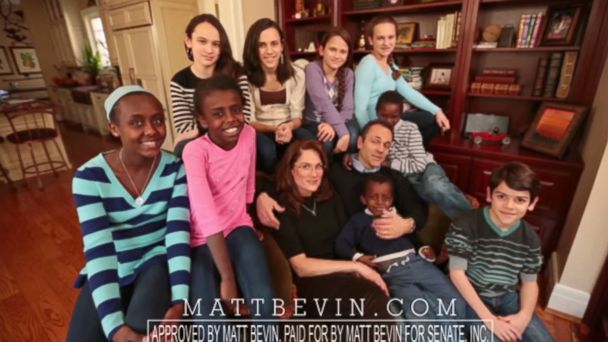Meet Campaign 2014's Youngest Combatants

(Matt Bevin For Senate)
By Alexander Mallin and Alina Kleineidam
Kentucky U.S. Senate candidate Matt Bevin, who is challenging Senate Minority Leader Mitch McConnell, wants voters to know that his opponent is telling lies about him.
And in a new campaign ad out this week, Bevin lets his nine children do the talking.
"Mitch McConnell is telling a bunch of lies about my dad," one of his daughters says directly into the camera in the 30-second spot. "Don't be fooled."
The ad amounts to a smiling montage of children in the Bevin family home who each offer testimonials about their father.
"Matt Bevin is my dad. He'll make a great U.S. senator," another one of his daughters adds, "and I should know, I've known him my whole life."
With his wife and children, four of whom are adopted from Ethiopia, surrounding him Bevin tells the audience he approves this message and "I approve these messengers too."
In Montana, another U.S. Senate candidate has also given his kids a starring role in his campaign.
Rep. Steve Daines, R.-Mont., features his bubbly daughters, Annie and Caroline, in a recent campaign ad.
"Like me, dad went to Montana State. He majored in mechanical engineering," Annie says in the ad just before Caroline chimes in: "Not like all those lawyers in Washington, D.C."
Daines, himself, makes only a brief cameo, appearing in the final five seconds of the one-minute spot to tell voters he approves the message "because I wanted you to meet my daughters."
Bevin and Daines are just the latest in a long line of American politicians who have sought to appeal to voters by enlisting youthful surrogates. But the tactic, which is now on full display during the 2014 midterm election cycle, leads to tricky questions about what role children should play in campaigns, if any, and the costs and benefits for politicians who choose to thrust kids into the spotlight.
The Strategy Is Not New
Lyndon B. Johnson's famous - and controversial - 1964 "Daisy" ad featured a 2-year-old girl to leverage an apocalyptic warning for voters considering his opponent Barry Goldwater.
"You have this symbol of innocence picking apart a daisy, and then you go from there to a nuclear explosion, and that person's future is gone," said John Geer, a professor of political science at Vanderbilt University, who has spent his career studying political ads. "Even though every life is equal, the protection of children is seen as more important to most people."
Johnson's ad kicked off a 40-year-long trend of candidates using children to make political points.
Travis N. Ridout, a professor at Washington State University, said using children can help politicians who are "trying to target specific groups of voters, for instance parents who have young children."
In an ad from the last presidential campaign cycle, Mitt Romney bashed President Obama's first term by showing a mother holding a baby, saying: "Dear Daughter, welcome to America, your share of Obama's debt is over $50,000."
Geer, who is an author of a study advocating attack advertising in campaigns, said negative ads like Romney's can be effective, but so can positive spots like the one that many political observers say helped Bill De Blasio win the New York mayor's race last year.
The ad features De Blasio's son Dante praising his father, though it's not made clear that Dante is De Blasio's son until the end of the ad.
By featuring their own children in their ads, politicians also have the chance to "seem more approachable" to potential voters, Ridout said.
A case in point is current Pennsylvania congressional candidate Daylin Leach, who is running in the state's Democratic primary for the 13th Congressional district. Leach released a campaign video Tuesday which includes his 11-year-old son acting out Daylin's tough childhood memories.
"I remember the day my mom said she could no longer afford to keep me. I grew up in foster homes across Northeast Philly," Leach says in a voice over.
He ends the ad surrounded by a room full of children, saying "I'm Daylin Leach, and I approve this message because I needed help once, and I'll fight for those who need help now."
And It's Not Just Candidates
Activist groups are getting into the action too.
Although it was never meant to air on television, a recent web video from PETA featured three young girls pleading to first lady Michelle Obama to nix real eggs from the White House's annual Easter Egg Roll.
At one point, a girl asks, "If all the other first lady's jumped off a bridge, would you?"
But putting children in political ads isn't without it perils.
One of the "lies" that Kentucky Senate contender Matt Bevin's commercial might be referring to stems from reports that the Republican candidate's LinkedIn account last year claimed he had attended the Massachusetts Institute of Technology.
Bevin has repeatedly denied the accusation, but a Twitter account affiliated with McConnell's campaign responded to the new commercial Tuesday saying "I was waiting for 'My dad went to MIT!'"
Though the tweet was quickly deleted, a spokeswoman for Bevin's campaign said in an email to ABC News, "It's not surprising that the McConnell campaign, which strives to sink to new lows every day, is launching more false attacks."
It's never a wise political move to go after children, according to Geer, the Vanderbilt political scientist.
"You don't want to attack kids like you don't want to attack grandparents," he said. "In the end the public will decide whether the kids were there as a political prop. You have to trust them to make the choice based on the traits of the candidate."